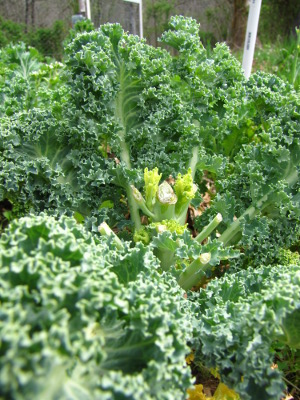
The most nutritional vegetables
 Long-time readers will recall that when I reviewed Gardening for Maximum Nutrition,
I was a bit dubious of the author's methodology in determining the most
nutritious vegetables. I was much more impressed by the Tennessee
Extension Service document entitled "Gardening for Nutrition" that Mom
gave me for my birthday, and I was also pleasantly surprised to see that
many of our own favorite vegetables received top billing therein. Based
on 100-gram samples, the top vegetables for providing vitamin A,
vitamin C, iron, calcium, and potassium were (in order of descending
quality):
Long-time readers will recall that when I reviewed Gardening for Maximum Nutrition,
I was a bit dubious of the author's methodology in determining the most
nutritious vegetables. I was much more impressed by the Tennessee
Extension Service document entitled "Gardening for Nutrition" that Mom
gave me for my birthday, and I was also pleasantly surprised to see that
many of our own favorite vegetables received top billing therein. Based
on 100-gram samples, the top vegetables for providing vitamin A,
vitamin C, iron, calcium, and potassium were (in order of descending
quality):
- Kale (our winter staple, and an overall best vegetable since it
ranks among the top four vegetables for all five nutrients measured)
- Spinach (tops the charts for potassium)
- Mustard
- Turnip greens (top the charts for calcium)
- Broccoli (our fall and spring staple that's high in vitamin C and in the top 15 for all five nutrients)
- Butternut squash (so I'm not the only one who thinks this is the best winter squash! An excellent source of vitamin A and a good source of potassium)
- Lima beans (top the charts for iron, but the nutrient is in a form
not readily absorbed by the human body, so take that with a grain of
salt)
- Hot peppers (top the charts for vitamin C, but how many can you really eat? (No, don't answer that, Joey.))
- Leaf lettuce (faring dramatically better than head lettuce, it's a particularly good source of iron and calcium)
- Okra
- English peas
- Snow peas
- Cauliflower (interesting --- I don't grow cauliflower because its whiteness always made me think it wasn't as good for me. And I guess it does trail its cousin broccoli by a pretty wide margin.)
- Collards (my least favorite leafy green. Coincidence?)
- Southern peas
- Asparagus
- Carrots (top the charts for most vitamin A per pound)
- Acorn squash
- Pumpkin (see why we grow butternuts instead?)
- Chinese cabbage
- Sweet potatoes
- Cabbage
- Snap beans
- Sweet peppers (after hot peppers, sweet peppers top the charts for most vitamin C per pound)
- Kohlrabi
- Cantaloupe (I guess the study's authors went by family for their "vegetables" and included cantaloupes because they're cucurbits?)
- Hubbard squash
- Irish potatoes
- Beets
- Tomatoes
- Eggplant
- Zucchini
- Crookneck squash
- Radish
- Turnip roots
- Scallop squash
- Head lettuce
- Corn
- Onions
- Watermelon
- Cucumbers
So now you know what you
should be growing (and training your family to eat) if you want to live
long and prosper! Plant some kale!
Want more in-depth information? Browse through our books.
Or explore more posts by date or by subject.
About us: Anna Hess and Mark Hamilton spent over a decade living self-sufficiently in the mountains of Virginia before moving north to start over from scratch in the foothills of Ohio. They've experimented with permaculture, no-till gardening, trailersteading, home-based microbusinesses and much more, writing about their adventures in both blogs and books.
Want to be notified when new comments are posted on this page? Click on the RSS button after you add a comment to subscribe to the comment feed, or simply check the box beside "email replies to me" while writing your comment.
RSS
comment 1
Rating veggies for nutritional content is like rating wood screws for flavor. As this site http://nutritiondata.self.com/facts/vegetables-and-vegetable-products/2461/2 shows, kale, your #1, is very good for A & C, but almost useless (<10% of MDR) for everything else. Hunt around that site (or any other that you prefer) and compare any veggie to beef: you'll see there's no comparison. One should eat veggies only as a source of carbs, as a minor source of supplements to meat and for their esoteric appeal. Beef should be what's for dinner.
Comment by
doc
— Thu Dec 25 05:35:31 2014
- Remove comment
Add a comment
